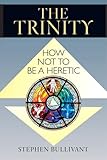The Trinity : how not to be a heretic / Stephen Bullivant.
By: Bullivant, Stephen Sebastian [author.].
Material type: BookPublisher: New York : Paulist Press, [2015]Copyright date: ©2015Description: x, 121 pages : illustration ; 23 cm.Content type: text Media type: unmediated Carrier type: volumeISBN: 0809149338; 9780809149339.Subject(s): Trinity | Trinity -- History of doctrines | Trinity | Trinity -- History of doctrinesDDC classification: 231.044
BookPublisher: New York : Paulist Press, [2015]Copyright date: ©2015Description: x, 121 pages : illustration ; 23 cm.Content type: text Media type: unmediated Carrier type: volumeISBN: 0809149338; 9780809149339.Subject(s): Trinity | Trinity -- History of doctrines | Trinity | Trinity -- History of doctrinesDDC classification: 231.044 | Item type | Current location | Call number | Status | Notes | Date due | Barcode | Item holds |
|---|---|---|---|---|---|---|---|
 Books
Books
|
BT111.3 .B85 2015 c.1 (Browse shelf) | Available | 16569 | ||||
 Books
Books
|
BT111.3 .B85 2015 c.2 (Browse shelf) | Available | #07-05 T | 16570 |
Includes bibliographical references (pages 119-121).
Introduction: Supreme simplicity -- More than words -- Meet the Trinity -- Rereading the Old Testament -- God à la modes -- True God from true God -- Why not three Gods? -- Three what? -- Afterword: How to be an ecumenist.
The Trinity is Christianity's most basic description of who God actually is and who he needs to be in order to save us. It is at the very heart of what Christians believe, and very little else in Christianity makes sense without it. Despite this, a great many Christians, including significant numbers of teachers, catechists, and preachers, do not feel confident in talking about it. It is not that they don't believe in the Trinity, because they certainly do. But they are not altogether sure that what they think they believe about it is what they are;supposed to, and they fear both revealing their ignorance, and leading others astray. he central idea of this book is that, contrary to popular assumption, the Trinity is a very simple doctrine. It consists of just three short, deeply scriptural convictions: i) There is only one God; ii) Father, Son, and Holy Spirit are all God; and iii) Father, Son, and Holy Spirit are not the same. The Trinity: How Not to Be a Heretic explains how the earliest Christians came to be convinced by each statement, why they matter, and how slowly, over a period of several centuries it found a way of saying all three at once. Its sole purpose is to help Christians of all kinds better understand the Trinity so that they can then help others Christians, non-Christians, and maybe even some not-yet-Christians better understand it too.-- Source other than the Library of Congress.
 Welcome to ACTS Library ACTS图书馆欢迎您
Welcome to ACTS Library ACTS图书馆欢迎您
There are no comments for this item.